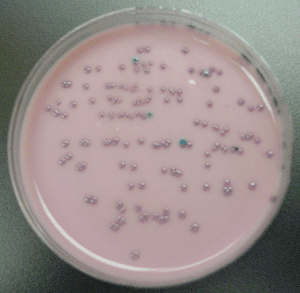
Food poisoning bacteria are everywhere–– in the soil, on animals, on people and on the things people touch and use. Some of the food poisoning bacteria include Clostridium botulinum, Salmonella enteritidis and Salmonella typhimurium. Salmonella is a common food-poisoning bacteria. Salmonella is generally found in cold- and warm-blooded animals. It’s is a non-spore forming bacteria that live in the gastrointestinal tracts of animals and humans. Salmonella can come from handling other pets or animals and reptiles that carry the bacteria. Salmonella is also found in feces of pet reptiles such as turtles, lizards, and snakes. Salmonella is often found in chicken and somewhat less often in beef.
Symptoms of food poisoning might begin within hours of the ingested food or even days later. Depending on the bacterium involved, symptoms may include severe diarrhea, fever and abdominal cramps.
Foods that are raw like red meat, milk products, poultry, shellfish and vegetables all have bacteria.
Food poisoning is a concern shared by consumers, industry and governments. The food industry is constantly changing with new and evolving technologies being implemented. Distribution systems are becoming much broader and accessibility to a wider variety of food products including imported foods is increasing. Challenges in food industry include the emergence of new food poisoning bacteria, known food poisoning bacteria becoming more resistant or virulent, and the susceptibility of certain people to food-borne infections. Every year in Canada approximately 10,000 cases of food poisoning cases are reported and it is estimated that the actual number is around 2 million. As the bacteria, fungi or viruses present in foods are the cause of food poisoning, microbiological testing of food and food ingredients has become mandatory for manufacturers, suppliers and distributors, importers or exporters.
As mentioned earlier, MBL specializes in microbiological testing of various foods and food ingredients for food poisoning bacteria. The following table shows food products and the types of bacteria tested at MBL.
| Product | Test: Detection & Enumeration |
|---|---|
| Butter | Standard Plate Count, Yeast & Moulds, E.coli/Coliforms |
| Cheese | Standard Plate Count, Yeast & Moulds, E.coli/Coliforms, Lactobacillus, Staphylococccus aureus |
| Cream | Standard Plate Count, E.coli/Coliforms, Staphylococccus aureus |
| Ice-Creams | Standard Plate Count, Yeast & Moulds, E.coli/Coliforms, Staphylococccus aureus |
| Liquid Milk | Standard Plate Count, Yeast & Moulds, E.coli/Coliforms, Staphylococccus aureus, Fecal Streptococci, Salmonella, Campylobacter, Bacillus cereus |
| Sweetened and Condensed Milk | Standard Plate Count, Yeast & Moulds, E.coli/Coliforms |
| Cereal and Cereal Products | Standard Plate Count, Yeast & Moulds, E.coli/Coliforms, Staphylococccus aureus, Salmonella |
| Confectionary | Standard Plate Count, Yeast & Moulds, E.coli/Coliforms, Staphylococccus aureus, Fecal Streptococci, Salmonella |
| Eggs and Egg Products | Standard Plate Count, Yeast & Moulds, E.coli/Coliforms, Salmonella |
| Fruits and Vegetables | Standard Plate Count, Yeast & Moulds, E.coli/Coliforms, Salmonella, Bacillus cereus |
| Fruit Beverages | Standard Plate Count, Yeast & Moulds |
| Meats | Standard Plate Count, Yeast & Moulds, E.coli/Coliforms, Staphylococccus aureus, Fecal Streptococci, Salmonella, Campylobacter, Bacillus cereus, Clostridium, Listeria |
| Fish and other Sea Foods | Standard Plate Count, Yeast & Moulds, Vibrio, E.coli/Coliforms, Salmonella, Bacillus cereus, Clostridium, Listeria, Campylobacter |
| Spices and Gums | Standard Plate Count, Yeast & Moulds, E.coli/Coliforms, Staphylococccus aureus, Fecal Streptococci, Salmonella, Lactobacillus, Clostridium, Bacillus cereus |

Methods For Food Testing
Microbiological testing of food at MBL follows guidelines and methods established by Health Products and Food Branch of Heath Canada, USFDA and ASTM. We routinely use Laboratory Procedure MFLP-10 for enumeration of total aerobic bacteria in food froducts and food ingredients.
Should you have a question concerning food testing for bacteria or any of our services, please call 905-290-9101.